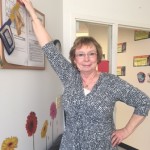Camelot Profile: Hoffman Estates Principal Andrew Derwin
 Andrew Derwin is in his first year as principal at Camelot of Hoffman Estates (therapeutic day school).
Andrew Derwin is in his first year as principal at Camelot of Hoffman Estates (therapeutic day school).
Andrew earned his bachelor’s degree from Illinois State University in Art Education and Photography and holds a master’s in Administrative Leadership from Olivet Nazarene University. He taught art for six years in the Plainfield, Illinois School District but he says he knew from the start that his life’s work would be helping struggling kids find their way. He got that opportunity when he became education director at Camelot of Bourbonnais where he was later promoted to assistant principal. After four years in Bourbonnais, Andrew was promoted in August 2014 to principal at Hoffman Estates. He is a very focused and strategic leader and is a great addition to the leadership team at Camelot Education.
What is the most significant program change you have made since taking the helm at Camelot of Hoffman Estates?
We have begun utilizing data more in analyzing the work we do. We are working our way toward daily logs of behavioral and educational data formatted into tables and graphs that we can share with parents and for IEP meetings. Like all schools, we already collect all this data on the kids like attendance, behavior, admissions and departures but we want to be more purposeful with it to make changes that would help move those measurements in a positive direction. As a result, we have seen students moving more quickly into leadership roles and taking on more responsibility. In addition, we have seen a dramatic decrease in the kinds of outbursts that require physical intervention.
You have emphasized art therapy, music therapy and horse therapy to the Hoffman Estates program. Why do you feel so strongly about that?
When I arrived, the school offered two therapies I had not been involved with before, pet therapy and horse therapy. Seeing pet therapy first hand and being part of it is amazing to see the interaction with the animals and to see the kids riding the horses and reaching those personal goals of being able to get up on the horse and ride around the track. The art and music therapy are invaluable. They give students a voice for things that they couldn’t explain before. They may not be able to say it, but they can write it or they can play music and express themselves in that way. It’s amazing to see how that’s interpreted and we can help students in a totally different way that I was blind to before.
How do you find the space for the horse therapy?
We are really lucky to be very close to a therapeutic horse ranch. It’s very difficult to find places that do therapeutic horse therapy and that are open to having students participate during the day. We take full advantage!
What is the largest reward you get from your job?
The largest reward is being able to affect the realization of what I had set out trying to attain five years ago after leaving the teaching position and moving into an administrative position. I wanted to see whether I could look at these problems and help these students come to better conclusions to help them solve some of these problems and grow. Just seeing that student growth, like students starting to get it and click is a fulfillment of that dream I had five years ago. It is even more the case this school year than when I was an assistant principal because I feel more responsible for the results. You just have these eye opening moments where you see the students and staff click, and they get it. It’s like staff will ask me, ‘why are we doing this a different way,’ and then it comes to the benefit and they’re like, ‘that was awesome.’ And I’m like, ‘yay, somethig works!’



